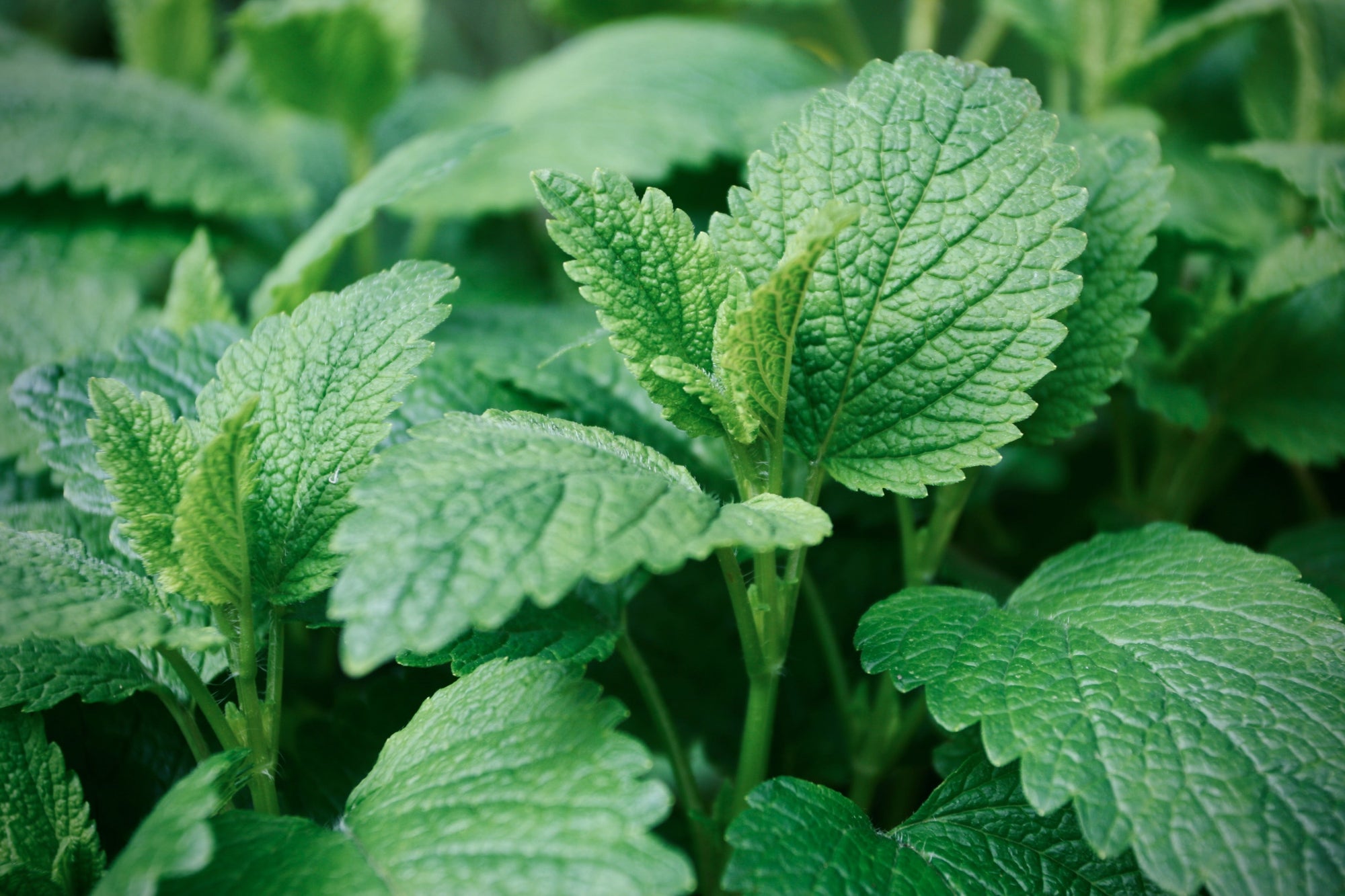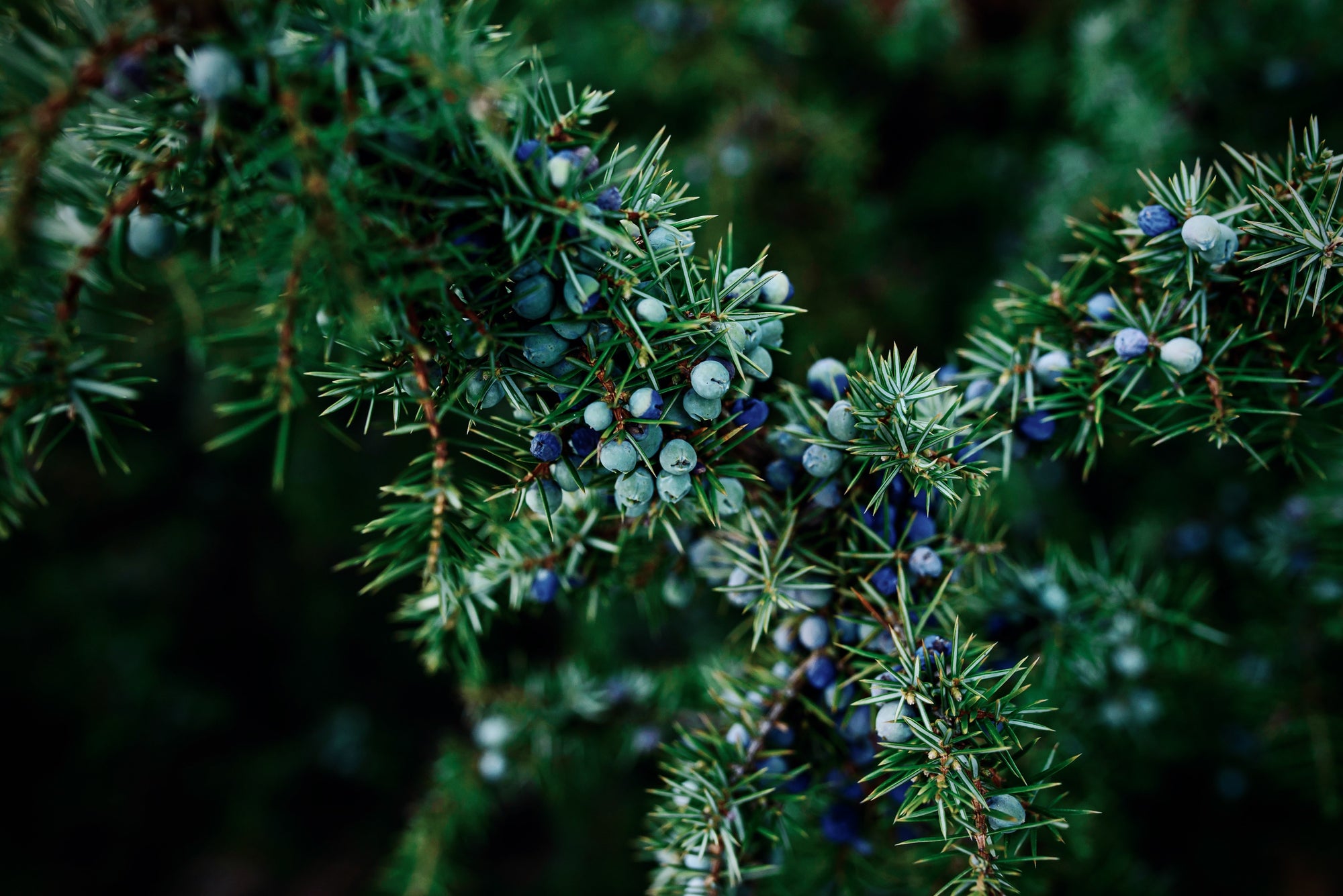
Associations
Element: Air / water
Planetary Ruler: Jupiter / moon
Mood: Uplifting, supportive, clarifying
Folkloric: Success, healing, happiness
History
Melissa, known today more commonly as Lemon Balm but in previous centuries as simply Balm (or Bawme), is known for is cheerful sweet citrus smell. As part of the mint family, its leaves are characteristically aromatic, the scent and flavour of which is pleasantly like lemon. Its scientific name Melissa comes from the Greek word for “honeybee,” the root 'Mel-' in both greek and Latin meaning 'honey.' Pliny the Elder (79 AD) writes of its characteristic ability to draw bees back to a hive where it is growing because they love its sweet nectar so much. Gerard (1597) confirms the use of Melissa rubbed on beekeeper's apiaries to help draw bees to it to start and keep a hive.
While not native to the UK, Melissa was brought over by the Romans 2000 years ago and adopted quickly into gardens and landscapes alike. It has both medicinal, emotionally restorative and culinary uses that have made this herb one of the most popular throughout the millennia.
In antiquity, Melissa was described by Dioscorides as having mood-lifting properties and an ability to soothe digestive complaints. The plant was a staple of monastic herb gardens throughout medieval Europe for this purpose also, and became a key ingredient in Carmelite Water—but more on that later!
Despite their very fragrant leaves, the plants do not yield much essential oil. In order to distill just 1ml of Melissa essential oil, it is necessary to use 7kg of leaves—making it one of the most expensive essential oils to produce, and therefore unfortunately one of the most commonly adulterated. Often cheap 'Lemon Balm' oils are actually just Citronella! At Equinox, we use only pure and authenticated organic essential oils, so to balance affordability and sustainability we offer true Melissa oil as a 5% diluted blend with organic jojoba to help spread the cost and the joy for everyone wishing to experience the oil for themselves. For those lucky enough to have Melissa growing in your gardens, you can make a nice infused oil at home or enjoy its medicinal properties in tisanes.
Traditional Uses
Throughout the centuries, Melissa has been widely used as a calming remedy for nervous tension, anxiety, digestive troubles, and even mild insomnia. Nicholas Culpeper praised it in his Complete Herbal (1653), quoting Seraphio the Younger (13th Century) in saying Melissa "causeth the mind and heart to become merry" and helps with fatigue.
"Melissa hath a singular virtue against the biting of venomous beasts, it is good against the stings of scorpions, wasps, and bees."
John Gerard, The Herball or Generall Historie of Plantes (1597) likely quoting Dioscorides (90 AD)
As mentioned above, the Carmelite nuns made a restorative decoction that became known as Carmelite Water or Eau de Melisse, and that still exists in German pharmaceutic applications as a modified version called 'Klosturfrau Melissengeist' which means 'cloister-woman (nun)'s Melissa-spirit.' This modern german herbal tonic is for pain relief and muscle tension, much like the early Carmelite Water that was said to ease tension, headaches, digestion and melancholy. There are lots of recipes you can find online to make a modern spin on this spirit, but the true traditional recipe is a guarded secret lost to the ages. However, it is known to have consisted of at least 14 different ingredients including spices like Clove and Cinnamon. For those interested in a little at-home alchemy wanting to make a room spray based on some rumoured Carmelite Water ingredients you can try this blend I've modified below:
CARMELITE WATER RECIPE
5 drops Lemon Balm (Melissa officinalis)
2 drops Lavender (Lavandula angustifolia)
1 drop Angelica Root (Angelica archangelica)
1 drop Orange Sweet (Citrus sinensis)
1 drop Cinnamon Bark (Cinnamomum verum)*
1 drop Clove (Syzygium aromaticum)*
1 drop Nutmeg (Myristica fragrans)*
100ml Perfumer's Alcohol base
*These essential oils can be irritating to the eyes/mucous membranes/skin so care should be taken when blending and spraying.
Folklore
With its bright, lemony scent and reputation for lifting spirits, Lemon Balm can easily be associated with joy, success, and prosperity however the plant itself surprisingly has no significant folklore of its own. Perhaps this is a testament to just how universally used it was—after all, to be referred to as not just a balm but the 'Balm' (you da balm!) in the 1600s, it must have been a very natural rather than supernatural part of the every day experience. But does that make Melissa any less special? On the contrary! Let's dive deeper into its association with bees, and specifically why its ability to draw bees to your apiary makes it one of the most potent and important herbs for success, protection and life-giving.
In Ancient Greece, the name Melissae (latinized) is sometimes used when referring to nymphs, priestesses or even goddesses. In Ephesus the bee was associated with the goddess Artemis, sometimes herself called 'the bee' and her devotees were also seen as bees. In Delphi there are accounts that the second temple of Delphi was 'built by bees' and the epithet for one of the oracles was 'the bee.' If we assume that the word melitas does not simply mean 'bee' but was actually associated with the divine, and that perhaps honey or 'mel-' root words thus could have a similar association with the ambrosia of the gods, then the name Melissa given to this plant becomes a sacred and honorary title. It clear to me that turning to Melissa in times of worry or pain to ease one's suffering could just as easily mean one was turning to Melissa officinalis or to the divine for help.
Although some people are afraid of bees because of their stingers, to many the bee is a cheerful sight in a healthy garden. As far back as medieval times, a custom in Western Europe referred to as 'telling the bees' would ward of misfortune so long as you remembered to tell your apiary first about deaths in the household, marriages, and other events of importance. Where this practice came from, one can only imagine may have roots back to the association of bees and divinity and perhaps an association with bees and the veil between worlds. In researching this article, I was delighted and surprised to learn this tradition is still alive and well, with the news of Queen Elizabeth II's death being told to the bees of Buckinham Palace in 2022 by her royal beekeeper.
Although Lemon Balm itself is not directly associated with ancient myth or folk tradition, I don't think it is a stretch to see it as an important herb to bear such an important name as 'Melissa'. Even in a modern context, the mere fact that bees prefer it and that it can be planted to attract bees to plentiful gardens make it one of the most important herbs today. Unfortunately we continue to see a worrying decline of bee populations which could lead to global food shortages from a lack of pollination power! If you would like to learn more and help bee populations in the UK, please visit the Bee Conservation Trust and learn how you can help support pollinator-friendly gardens. Melissa will thank you!
Aromatic Profile
- Note: Top
- Scent Family: Citrus, sweet, bright
Essential Oil Safety Information
- Never ingest/take internally.
- Avoid contact with eyes and mucous membranes.
- Keep away from children and pets.
- Full safety information and directions will be provided in a safety card upon purchase, please read fully.
Bibliography & Sources
Battaglia, S. (2003). The complete guide to aromatherapy (2nd ed.). International Centre of Holistic Aromatherapy.
Carta, Louise (2024). Diploma Course Study Materials. The Aromatherapy Company.
Culpeper, N. (2007). Culpeper’s complete herbal: Illustrated and annotated edition. Wordsworth Editions. (Original work published 1653)
Elderkin, G. W. (1939). The Bee of Artemis. The American Journal of Philology, 60(2), 203–213. https://doi.org/10.2307/291201
Gerard, J. (1975). The herbal or general historie of plantes (Rev. & ed. by T. Johnson, 1636). Dover Publications. (Original work published 1597)
Klosterfrau Healthcare Group. (n.d.). Company. Retrieved June 29, 2025, from https://www.klosterfrau.com/#company
Lawler, L. B. (1954). Bee Dances and the “Sacred Bees.” The Classical Weekly, 47(7), 103–106. https://doi.org/10.2307/4343554
Monterey Bay Herb Company. (n.d.). The story of Carmelite water. HerbCo.com. Retrieved June 29, 2025, from https://www.herbco.com/s-2719-the-story-of-carmelite-water.aspx
Sharman, J. (2022, September 12). Royal beekeeper informs Queen’s bees that their keeper has died in bizarre tradition. The Independent. https://www.independent.co.uk/life-style/royal-family/royal-beekeeper-bees-queen-death-b2164345.html
Tisserand, R., & Young, R. (2013). Essential oil safety: A guide for health care professionals (2nd ed.). Elsevier Health Sciences.
Washington College. (n.d.). Melissa officinalis. Retrieved June 29, 2025, from https://www.washcoll.edu/learn-by-doing/lifelong-learning/plants/lamiaceae/melissa-officinalis.php




